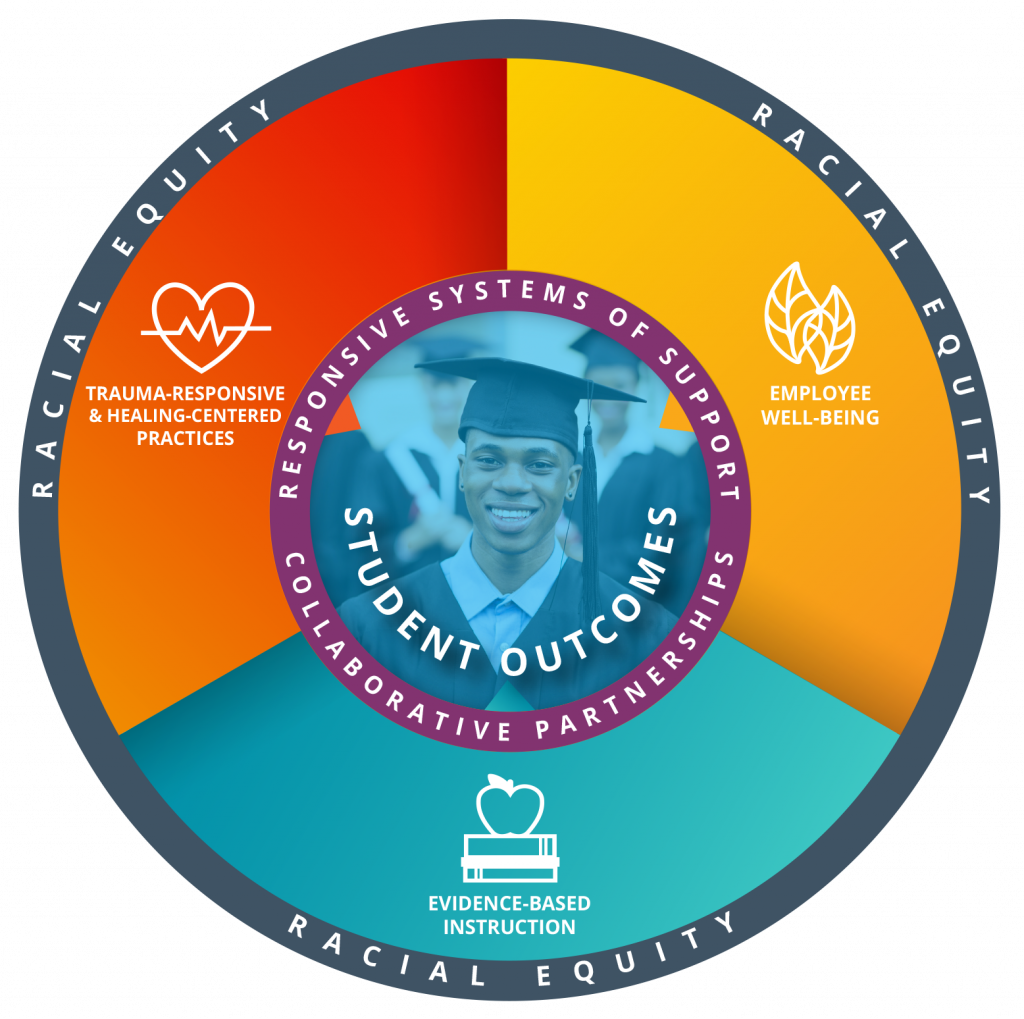District 287 is committed to advancing racial equity and producing equitable student outcomes through evidence-based instruction, trauma-responsive and healing-centered practices, and employee well-being. Racial equity is foundational to District 287’s mission and embedded in all its priorities.
2021 Strategic Priorities Impact Report

Our racial equity value compels us to focus on the impact of race and make decisions in the best interest of students from diverse racial experiences. We believe our nation’s education system has systematically perpetuated marginalizing and debilitating beliefs in students of color; we believe in intentional reversal of such practices and returning to a belief that every student has inherent intellect and gifts and our job is to provide opportunities for it to grow. We work to become a more racially equitable school district. We focus on discovering our racial identities, establishing a standard of truth through authentic relationships, removing systemic inequities, increasing opportunities and recognizing the impact of living in a society with a culture normed in Whiteness so we can eliminate achievement disparities. Our strategic efforts include: It is our goal that member districts will declare satisfaction with student outcomes resulting from Intermediate District 287’s specialized services. We have developed and defined the indicators and methods of measuring student outcomes, and a system for collecting, storing and reporting student outcome data. Key aspects of implementation include: District 287 has taken key actions to ensure our schools are safe and responsive to the needs of students who have experienced trauma. Nuerosequential Model in Education - District 287 partnered with some of the top trauma experts in the country to train 40 of our staff in responding to childhood trauma. Therapeutic Teaching Classrooms - In 2018 we partnered with the Amherst H. Wilder Foundation to launch the Therapeutic Teaching Model, an integrated educational and therapeutic approach for students who have experienced severe trauma - where a teacher and clinical therapist work together in the classroom on the therapeutic needs and learning needs of students. Professional Development - Training for staff in trauma, crisis, de-escalation, etc. Even though we have one of the most challenging populations of students, intermediate school districts don’t receive PD funding like other public schools. District Mobile Response Team - A team of four licensed mental health professionals that work to prevent and respond to significant crises each day across the district. They respond to over 300 critical incidents each school year. Student Safety Coaches Model - We replaced School Resource Officers with Student Safety Coaches who are focused on building relationships with students and addressing behavior before it escalates to needing police intervention. Incidents with police involvement decreased by half within two years and schools report fewer arrests, citations, and suspensions. Employee Well-being - At times staff can experience an injury or things like compassion fatigue and burnout. We offer up to six free counseling sessions for employees and their families on key issues, including race-related trauma. Our mobile response team provides reflective consultation and support after a staff injury or critical incident. It’s not just in the classroom where teaching and learning happens. We focus on instruction wherever it may happen in order to reach our goal of incorporating 90 minutes of literacy instruction for every student, every day. Evidence-Based Instruction - Evidence-based instruction encompasses quality instruction and all of the academic and social-emotional learning supports and interventions, both in and out of the physical classroom. It also complements all of the additional supports our students need, such as mental health and trauma-response supports. Decades of research tells us that providing quality instruction for every student, holding high expectations for all of our students, and a strong belief that each student can learn will lead to better student outcomes. Culturally-Responsive Instruction - Evidence-based instruction must be culturally-responsive, meaning that educators recognize the importance of including students’ cultural references in all aspects of learning. We continue to focus on Classroom Instruction that Works as our model for providing the consistently effective, racially and culturally-responsive instructional practices our students need. Innovative Instructional Coaches - The 20 staff in these roles help lead instructional practice in our sites and support educators to attain their professional learning goals. These coaches help to provide the on-the-job learning and co-teaching opportunities that our staff deserve. Coaches are committed to raising their racial consciousness and understanding the prevalence of systemic racism in the educational system. It is every educator’s job to be racially and culturally-responsive in their teaching, learning, and interaction with students and with each other. Sand Creek Partnership - In 2019, District 287 launched a new partnership with Sand Creek, an Employee Assistance Plan. All 287 staff and their families receive six free counseling sessions. The counselors are familiar with 287’s challenges, and they understand the uniqueness and safety challenges in our schools. And because equity is central to our work, staff have access to diverse counselors who are familiar with the challenges in our racially diverse communities and LGBTQ, faith-based, and multilingual communities. 
 As a school district, we are on a journey to becoming a trauma-sensitive and healing-centered organization. We are already doing many things as part of our day-to-day work to support students who have experienced trauma, things like Social-Emotional Learning, Positive Behavior Supports, and Restorative Justice practices.
As a school district, we are on a journey to becoming a trauma-sensitive and healing-centered organization. We are already doing many things as part of our day-to-day work to support students who have experienced trauma, things like Social-Emotional Learning, Positive Behavior Supports, and Restorative Justice practices.
 We know that students have their best chance at success when the adults around them are in the best position possible to support them. That’s why wellbeing is at the center of all of our priorities. Students will thrive and all other priorities can be achieved when employees are well.
We know that students have their best chance at success when the adults around them are in the best position possible to support them. That’s why wellbeing is at the center of all of our priorities. Students will thrive and all other priorities can be achieved when employees are well.